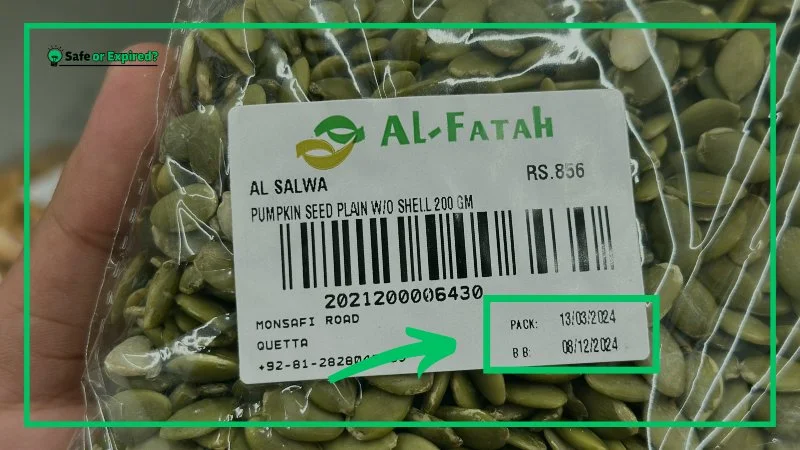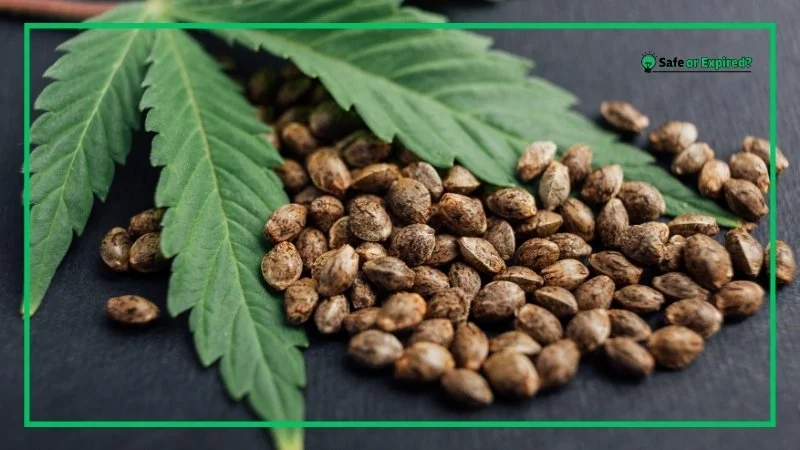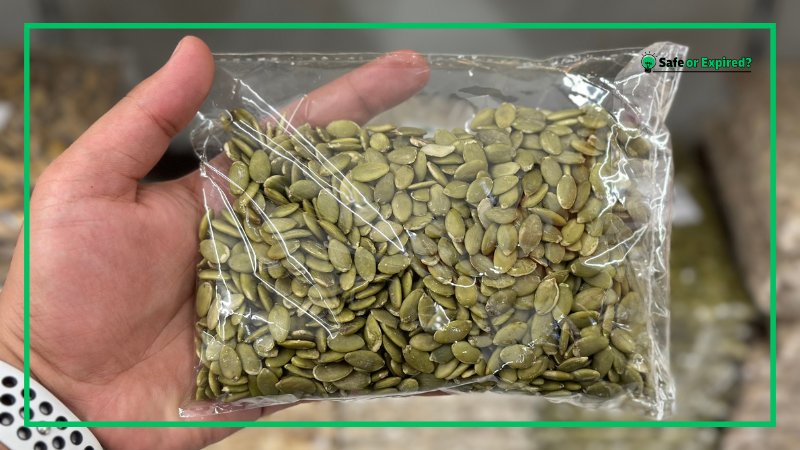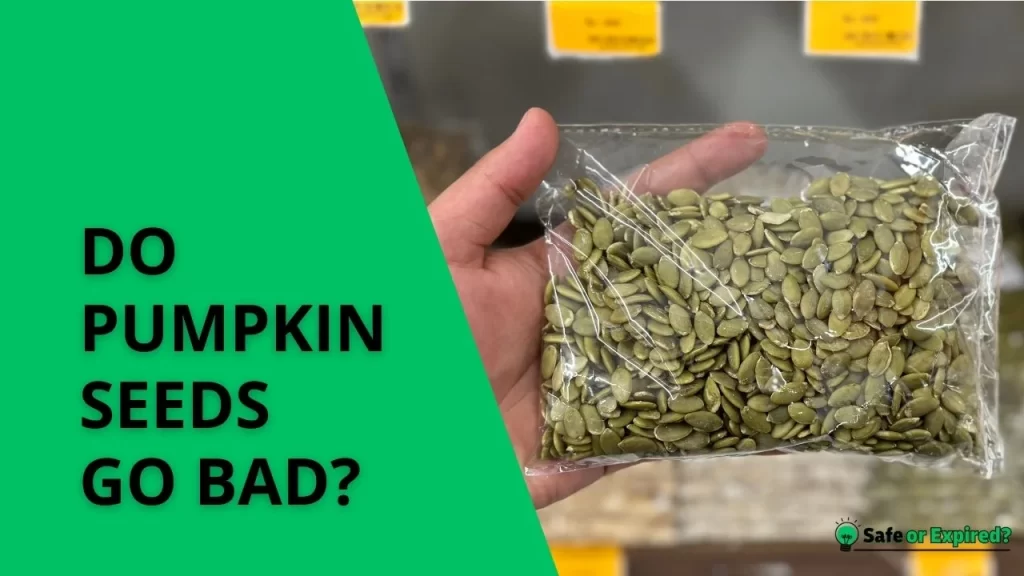“Do pumpkin seeds go bad?” is a question about food safety. The answer is – yes, they can, especially when exposed to air or heat for too long. But worry not; this guide will show you how to tell if pumpkin seeds have gone bad and what can you do to maximize their shelf life. Keep reading.
Do Pumpkin Seeds Go Bad?
Yes, pumpkin seeds can go bad due to exposure to air, moisture, heat, or improper storage. Signs that pumpkin seeds have spoiled include:
- Mold growth
- Discoloration
- Rancid smells
- Change in texture, like becoming slimy or rubbery.
Moreover, the expiration date printed on the pumpkin seeds’ package is another indicator.

Do Pumpkin Seeds Go Bad in the Fridge?
Pumpkin seeds can last longer when stored in the fridge, but they can still go bad if not kept in an airtight container. Proper storage in the fridge can extend their shelf life to months. However, ensure the temperature stays constant and below 40°F (4°C).
Wondering, “How long do raw pumpkin seeds last in the fridge?” Well, about 6 to 12 months in the fridge when stored in an airtight container. Keeping them in the fridge helps to inhibit bacterial and mold growth, preserving their freshness.
Do Pumpkin Seeds Go Bad in the Freezer?
Freezing can prolong the shelf life of pumpkin seeds. If you store it in an airtight container or freezer bag, these seeds can last for up to a year or even longer in the freezer.
Do Pumpkin Seeds Go Bad If Left Out?
Pumpkin seeds left out can go bad more quickly if they are exposed to air and moisture. If stored in the pantry, they can last about 2 to 3 months if kept in a dry location and sealed in an airtight container. If left out in high humidity or warm conditions, they can spoil much sooner.
Check out this image of poor-quality and spoiled pumpkin seeds to get the idea.

When exploring whether pumpkin seeds go bad, it’s helpful to consider the shelf life of other popular seeds and nuts. For example, chestnuts are another common snack that can sit around for a while. If you’re curious about whether they spoil or how to store them, check out “Do Chestnuts Go Bad?”.
Similarly, almonds are a favorite for many, but what happens when they pass their expiration date? To find out whether expired almonds are still safe to eat and how long they last, take a look at “Should You Eat Expired Almonds and How Long Do They Last?
How To Tell if Pumpkin Seeds Are Bad? Look for THESE Signs
To check if pumpkin seeds are bad, look for visible signs like mold, discoloration, or a change in texture. Additionally, if they have an off smell or taste, it’s a good indication that they have gone bad. Discard pumpkin seeds if you notice these signs to avoid potential health risks.
Visual Signs of Bad Pumpkin Seeds
Mold growth, discoloration, and slimy texture are clear indicators of bad pumpkin seeds. Wondering what do moldy pumpkin seeds look like? Mold can appear as fuzzy white patches or black spots on the seeds. Discoloration could mean a change from the usual white or greenish hue to brown or dark spots. A slimy or sticky texture is another sign that the seeds have gone bad.
Off Smells and Tastes
Rancid smells and sour tastes indicate that pumpkin seeds have gone bad. Rancid seeds often emit a stale or musty odor, suggesting they’ve been exposed to air or moisture for too long. If the seeds taste bitter, sour, or simply off, it’s best to throw them out. Consuming rancid seeds may not cause harm, but they lose nutritional value and taste unpleasant.
Changes in Texture
Fresh pumpkin seeds are firm and crunchy. When they go bad, they can become soft, rubbery, or overly dry. These textural changes can occur due to improper storage or prolonged exposure to air. If you notice that the seeds are no longer crisp, it’s a sign they have lost their quality and may be spoiled.
Storing pumpkin seeds in the fridge or freezer can help extend their shelf life. If you plan to keep them for a long time, freezing is a great option.
What Happens if You Eat Expired Pumpkin Seeds? (The Details)
Eating expired pumpkin seeds can lead to food poisoning if they have gone bad. Symptoms include nausea, vomiting, and diarrhea. While not all expired seeds are dangerous, those that have mold, rancid smells, or off-tastes should be avoided to prevent health risks.
Here’s a picture of good-quality pumpkin seeds to get the idea.

How Long Do Pumpkin Seeds Last for Growing?
Pumpkin seeds can last for several years if stored properly, but their viability for growing declines over time. Typically, pumpkin seeds can be used for growing for up to 4 to 6 years, with optimal germination rates occurring within the first 2 to 3 years.
Seed viability depends on various factors like storage conditions, seed quality, and age. To ensure the seeds remain viable for growing, store them in a cool, dry place. Proper storage, such as in airtight containers, helps maintain seed health and extends their lifespan.
If you’re unsure about the viability of pumpkin seeds, it’s better to do a “germination test.” It’s simple. Start by putting a few seeds on a damp paper towel. Then, cover them with another damp towel. Keep them in a warm location for a few days. If the seeds sprout, they’re still good for planting. Otherwise, they might be too old to grow.
Do Roasted Pumpkin Seeds Go Bad? Know the Answer
Yes, roasted pumpkin seeds can go bad if not stored properly. They are susceptible to spoilage due to exposure to air and moisture. Both can cause mold growth or make the seeds go rancid. Storing roasted pumpkin seeds in an airtight container in a dry spot can help prevent spoilage.
People also ask, “How Long Are Pumpkin Seeds Good For After Roasting?” Roasted pumpkin seeds can stay good for up to a month at room temperature if stored in a dry place.
If you need them to last longer, refrigeration can extend their shelf life to about 3 months. For even longer storage, you can freeze roasted pumpkin seeds, which can keep them fresh for up to 6 months. However, storing them in the freezer may make them a bit soft, so reheating them in the oven for a few minutes can help restore their crunchiness.
Do Sprouted Pumpkin Seeds Go Bad? Key Details
Sprouted pumpkin seeds can go bad if not stored properly. Like other types of pumpkin seeds, sprouted seeds are susceptible to mold, bacteria, and rancidity when exposed to air, moisture, or heat. To keep sprouted pumpkin seeds from spoiling, follow food safety guidlines and store them appropriately.
Factors Contributing to Spoilage
Sprouted pumpkin seeds can go bad faster than raw or roasted seeds due to the increased moisture content during sprouting. Exposure to air and improper storage can lead to mold growth, spoilage, or a sour smell. Ensure that sprouted seeds are kept in an airtight container to minimize the risk of spoilage.
Do Dried Pumpkin Seeds Go Bad? Understand the Shelf Life
Yes, dried pumpkin seeds can go bad, especially if not stored properly. Improper storage condition is one of the leading causes behind the spoilage. If the seeds are exposed to air and moisture, you may see mold growth, rancidity, and other signs of spoilage.
Does Pumpkin Seed Oil Go Bad? Yes or No?
Yes, pumpkin seed oil can go bad. It is prone to oxidation and can turn rancid if exposed to air, light, or heat for extended periods. The rancid pumpkin seed oil has a distinct off-smell and bitter taste. To prevent this, store the oil in a dark place, preferably in an airtight container.
Do Cooked Pumpkin Seeds Go Bad? Everything to Know
Yes, cooked pumpkin seeds can go bad. Although cooking can kill harmful bacteria, cooked seeds are still susceptible to spoilage due to air and moisture exposure.
The signs of badly cooked seeds include a change in texture, an unpleasant smell, or visible mold growth.
Do Baked Pumpkin Seeds Go Bad? Find Out
Yes, baked pumpkin seeds can go bad if they are not stored properly. Factors like air, moisture, and heat can cause them to spoil. To prevent this, store baked pumpkin seeds in a cool place. Signs that baked pumpkin seeds have gone bad include mold, an off smell, or a change in texture.
Can Uncooked Pumpkin Seeds Go Bad? The Answer
Uncooked pumpkin seeds can go bad, especially if exposed to moisture, heat, or air for extended periods. The most common signs of spoilage are mold, discoloration, or a musty odor. To prevent uncooked seeds from going bad, store them correctly. For longer storage, consider refrigerating or freezing them.
Here’s a table outlining the typical shelf life for various types of pumpkin seeds:
| Pumpkin Seed Type | Pantry | Fridge | Freezer | Room Temperature |
| Raw Pumpkin Seeds | 2-3 months | 6-12 months | Over 1 year | 3 months |
| Roasted Pumpkin Seeds | 2-3 months | Up to 3 months | Up to 6 months | Up to 3 months |
| Cooked Pumpkin Seeds | Not recommended | Up to 3 months | 6 months | Up to 1 month |
| Baked Pumpkin Seeds | Not recommended | Up to 3 months | Up to a year | Up to 1 month |
| Uncooked Pumpkin Seeds | Up to 6 months | 6-12 months | Over 1 year | Few months |
| Sprouted Pumpkin Seeds | Not recommended | Best if kept in fridge | Few months | Few months |
| Pumpkin Seed Oil | Several months (cool, dark place) | Up to best by date | Slightly past best-by-date | Not recommended |
Conclusion
In summary, pumpkin seeds can go bad if not stored properly, but with the right precautions, you can keep them fresh for a long time. Here are some key points to remember:
- Shelf life: Raw pumpkin seeds can last for several years, while roasted seeds typically last for a few months.
- Storage: Keep pumpkin seeds in airtight containers and store them in cool, dry places.
- Signs of spoilage: Mold, discoloration, and off smells are clear indicators that seeds have gone bad.
By following these tips, you can ensure that your pumpkin seeds stay fresh and delicious for as long as possible.

